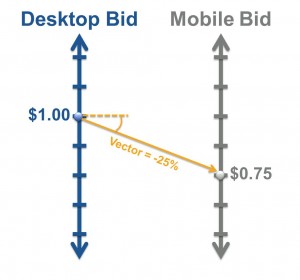Google’s Enhanced Campaigns – What are they Enhancing?
February 7, 2013Yesterday, Google announced that it will be fundamentally changing the way in which enhanced campaigns are structured in AdWords. Basically, rather than offering search marketers the flexibility of creating separate desktop, mobile and tablet PPC campaigns based on the performance associated with each device, Google is now ‘streamlining’ the process and introducing the concept that I like to call the UBER-campaign.
The idea behind it is that desktop and tablet experiences are so alike that those devices should be treated equally (i.e. tablet-specific campaigns are no longer needed). Mobile should be an extension of that experience, so all desktop/tablet keywords will be opted into mobile. In addition, mobile campaigns are treated as an appendage to the desktop campaign, so mobile-specific campaigns are no longer needed. Mobile bids now act as a level or ‘vector’ against the desktop baseline CPC. For example, if the desktop keyword has a max CPC of $1.00 and the optimum mobile bid is $0.75, the mobile vector needs to be set at -25%.

Source: GroupM Next 2013
This will quickly get highly complicated as PPC search marketers now need to start thinking in percentages, not actual bid amounts. Another consequence of having mobile bids tied to desktop bids via percentage vectors is that any changes to the desktop bid will have a ripple effect that needs to be factored in.
While this campaign enhancement will make it more streamlined for advertisers with a website built with responsive design (which detect what device a searcher is coming from and serve up the appropriate experience), it will make it more difficult to opt out of mobile for those advertisers that are not yet prepared to invest in a mobile experience for their users. Advertisers can no longer opt out of mobile at the keyword level, but will need to re-evaluate their campaign structure to compensate for this automatic opt-in.
Of course, the most important issue with this new change will be the overall cost. As we have seen in the past with major changes at the engines (think Yahoo/BING integration), CPCs will become wildly volatile until search marketers understand all the cause and effect consequences of such changes. Even experienced search marketers will require some time to understand the ramifications as they dig into the details. Less experienced marketers and smaller agencies will be left to fend for themselves which will add to the market volatility in the short-term. Ultimately, the fact that all desktop keywords will automatically be opted into mobile will increase the competition in the space and lead to higher overall CPCs.
Keep in mind that more details about this update (and the devil is in the details!) will emerge over the coming weeks. As search marketers start getting their very detailed questions answered, more information regarding what all of this really means will continue to evolve. Stay tuned!





